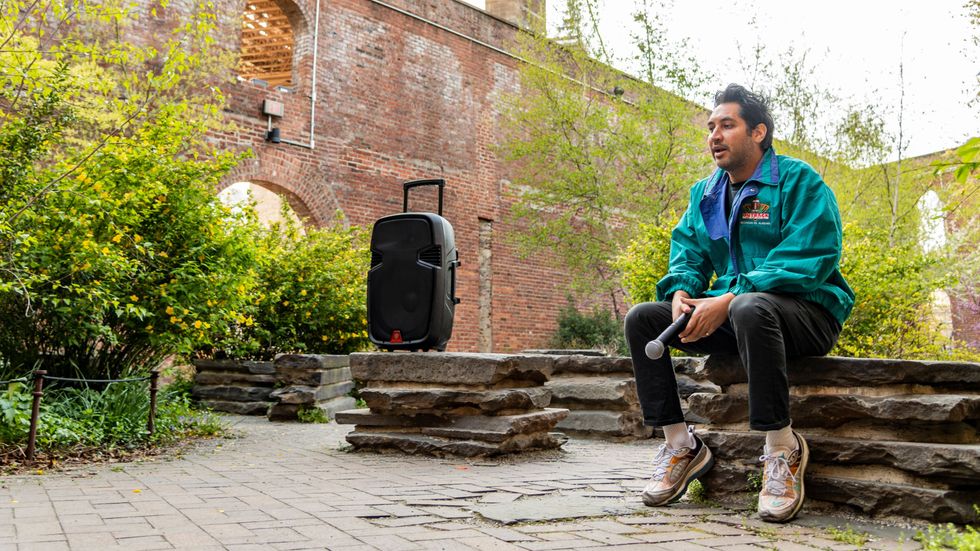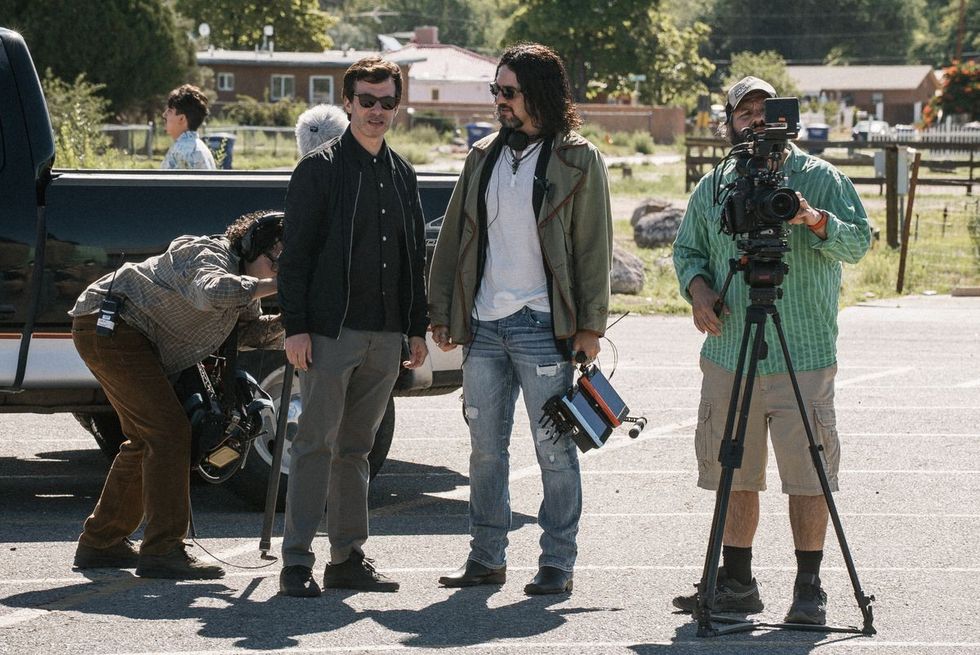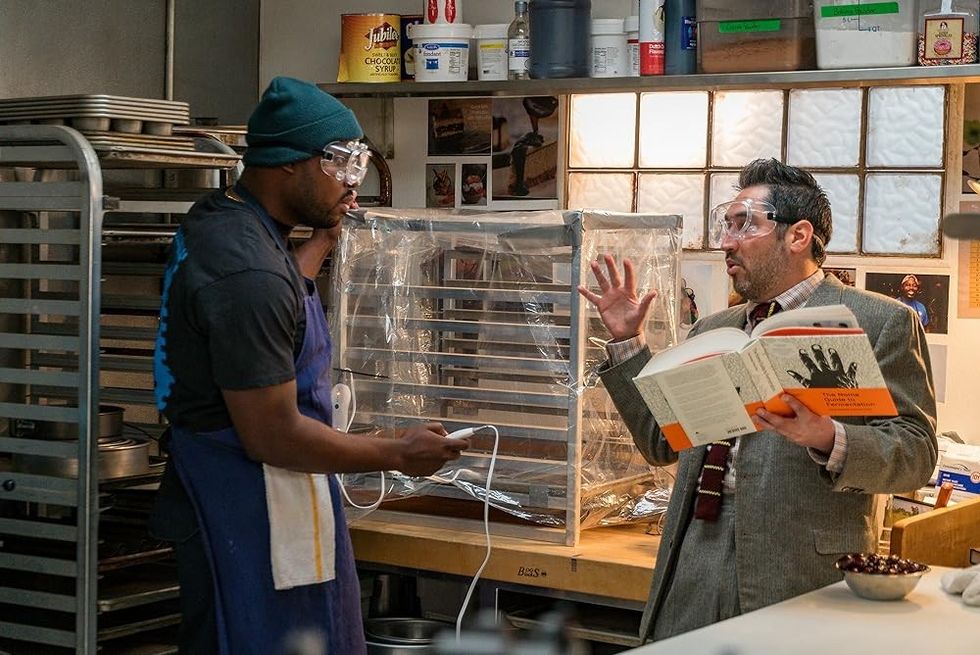
Anyone watching Nathan Fielder and Benny Safdie’s absurdist, satirical masterpieceThe Curse (A24/Showtime) can probably agree—it’s not for the faint of heart.
Which, to be fair, isn’t a groundbreaking take nine episodes in approaching the finale. But, wow, amends to the faint hearts that have endured these first nine episodes of this deliciously cringe work of art.
Fielder and Safdie (a creative dream team that warms my very own faint heart) craft a dark and biting narrative that uses an absurdist lens to tackle everything from failed marriages to break-neck stereotyping to gentrification via HGTV; among many other examples of nuanced, well-written commentary on modern culture.
Which, if you’re familiar with Fielder or Safdie’s work leading up to The Curse, should come as no surprise. It’s (delightfully) exactly what you’d expect.
Fielder and Safdie are credited as stars (along with Emma Stone, who is incredible), writers, directors, and creators of the series, and their imprint is there full-force. But, just like any production, they aren’t alone in their craft.
For writing in particular, they had a room of three additional staff writers that helped develop the narrative and pitch jokes (among other contributions): Carrie Kemper, Alex Huggins, and Carmen Cristopher.
Christopher—a great, unconventional comic best known for his bit parts on Joe Pera Talks with You and I Think You Should Leave, as well as playing Chester on The Bear and his own satirical man-on-the-street style special Carmen Christopher: Street Special (Peacock)—was kind enough to speak with No Film School about his experience working on The Curse, as well as share some insight into how he landed the gig in the writers room.
The following quotes from our interview with Carmen Christopher are edited for clarity.
Carmen Christopher On Getting Hired for A24/Showtime’s ‘The Curse’

“Honestly, it’s been a very long journey. No shortcuts taken. I started in Chicago. I did [improv at] Second City, iO, The Annoyance Theater. I started doing sketch comedy out there. That’s when I started writing and I was doing solo characters and stuff. I did that for about four or five years, started off really bad, got really good.
My first job was writing for the Chris Gethard Show. But after that I went without working for three years, maybe? I couldn’t get a job. I was getting down to final submissions and the final round for several jobs.
The question of [how did I become] a staff writer, the answer is I always made my own stuff.
I made short films. I made small videos for Instagram at the time. I had a pilot written. I was always writing my own videos, writing something to shoot because I always wanted to perform, too.
So I figured the best way to get myself out there is to write and be in the things that I want to do. And I think that’s what led me to The Curse.
During the Pandemic, I got an email from Nathan [Fielder]. My manager messaged me and said, hey, Nathan and Benny are putting together a small room and they’re interested in you. And I was like, this is crazy. And, so, obviously at that time—I love Nathan for You, and Uncut Gems was my favorite movie.
I got an email from Nathan. He was basically like, “I saw your short film ‘I’m Killing It!!!’ I watch it every time I’m sad.”
It was funny, plus it felt complimentary. It was really nice. I was like, holy shit, this made Nathan feel. And then he read my pilot and liked it, and we hopped on a Zoom. It was me, Nathan, and Benny. They got off the Zoom and I felt like it was a really good conversation and that I’d probably be doing the job, honestly.
So my journey to staff writing was truly just hours and hours of just making stuff. And I don’t know how Nathan saw my short film, but you just put stuff out there that you think is good and hopefully the right eyes see it. It’s a bit of luck, and it’s a bit of just doing what you love to do.”
On the writing Process for ‘The Curse’

“Nathan and Benny wrote the pilot. From there, [the writers room] broke down the whole series together, outlined it. Then we kind of went through each character and tracked their storylines throughout the whole show, and we would meet on Zoom daily.
I’d read the notes before going in each day just because I wanted to be on top of stuff from the previous day. Benny and Nathan would already be on Zoom an hour [before each session] and they would already be in a deep debate about something and we’d wait for them to resolve it, and then they would talk about where we were at and everybody would just pitch.
You pitch, pitch, pitch. When you’re a staff writer, you’re kind of just throwing darts at a board and you’re hoping something sticks. But if it doesn’t, when you’re a staff writer, you’re trying to serve the vision of the creators. But I would still pitch ridiculous stuff that absolutely did not get in.
Sometimes [you just want] to make the room laugh. You want to have fun with the people you’re writing with, and maybe if what I’m saying is dumb and it’s funny, maybe it’ll inspire an actual good idea.
But yeah, we outlined it. Then we outlined the progression of each character’s arc throughout it, and then Nathan and Benny would go off and write the outlines and then they would send the outlines to us. And then we would, on our own, each go through and write notes, pitches.
This makes sense, this doesn’t, what’s happening here. Send those in.
They would look at it and we’d get together, talk about bigger things, and then Nathan and Benny [would write] all the scripts, and same thing, they sent us the scripts back, and then we pitch on them and whatnot, and that’s the shorthand version.
But yeah, it was 90% Nathan and Benny. And then I’m just trying to give as many ideas as I can to help them be happy with whatever they want to make.”
Working with Nathan Fielder and Benny Safdie

“Working with them was really cool and really interesting. We just got into it right away. There was no getting to know each other, really. It was like, let’s work.
And they were very—we’d get onto Zoom, and, like I said, Nathan and Benny were already on Zoom. They’de be an hour before us, and it was like, just go, go, go.
I felt like I had to be on top of my toes because I loved their work so much that I really put in an effort to make sure I kind of knew where we were at all points in terms of story and pitching. So I would do work outside of the [writing room] hours, whether it be research watching HGTV television shows, doing a little bit of research about curses, getting to know the land of New Mexico, or just environmental homes.
It was fun research, it was great. At first I was like, this is scary. But then right away I was like, we’re here to work, and they’re all about the work, and it was cool to see just two people that you admire work together.
Working with Nathan and Benny was great. It was great to work with them, learn from them, and hopefully add to a show that I ended up really loving.”
On Working with Joe Pera and Tim Robinson
“I think those are the people, coincidentally, that subconsciously I’ve been trying to make a laugh.
You kind of do comedy when you’re young to make your friends laugh, and as an adult, it doesn’t really go away. You want to make the people laugh that you also think are funny. So luckily those people have laughed and put me in their stuff.”
On Best Writing Practices for Aspiring Writers

“Yeah, man, just you have to write and you have to put it out in the world so that people can see it. Something that I feel like has given me some solace—or something that has given me confidence with moving forward and creating something good—is I think the number one thing you need to write something good is time.
The more time you have, and the commitment to the time that you put into it, the more likely it’ll be good.
For example, I’m writing a feature script right now, and my goal is to at least just look at it for 20 minutes a day. I don’t have a deadline, I’m writing this on my own. It’s getting better and better every single time. It’s chipping away, you’re making a sculpture.
You need to find a way to set aside time and put it in your calendar the same way you would your friend’s 30th birthday party.
I think if you do that, and make it a priority, it’s still easy to just skip a day. It’s like people that are jacked at the gym, they don’t skip a day at the gym, have to do all those hours.
You know what I mean? That was the worst analogy ever, but you know what I mean? You just really have to, you want to do it, you have to put aside the time.”
Carmen Christopher is currently staff writing for Peacock’s Killing It and working on writing his own feature film. If you’re central to Los Angeles you can catch his upcoming show at 7:30 PST Thursday, January 18 at The Elysian Theater.
Author: Grant Vance
This article comes from No Film School and can be read on the original site.
